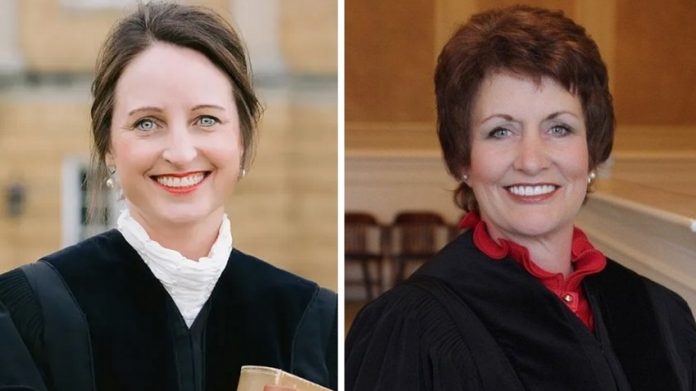Fort Smith, ARK – In a significant legal development, Arkansas Supreme Court Chief Justice Karen Baker has overturned two orders issued by associate justices that directly opposed her decisions made shortly after taking office on January 1. The orders challenged her authority regarding the termination of the Administrative Office of the Courts (AOC) director and the appointments to the Judicial Discipline and Disability Commission (JDDC).
Baker’s ruling emphasized that as Chief Justice, the decisions in these matters fall solely under her jurisdiction. “The associate justices, separately or altogether, cannot overrule the Chief Justice in administering the functions of the court,” Baker stated in her order. She went on to underscore that the constitutional duties of the Chief Justice, an elected position, cannot be overtaken by the associate justices, no matter how many of them there are.
Baker also hinted at a political angle in her ruling, suggesting that two of her former opponents in the race for Chief Justice, who remain on the court, were attempting to usurp the role she was elected to by the people of Arkansas. “Notwithstanding the will of the people in selecting me to serve in this position, two of my opponents in the Chief Justice race that remain on the court are now attempting to take what the people would not give them by force,” Baker wrote. She invoked the state’s motto, “Regnat Populus—The People Rule,” as a reminder of the people’s sovereignty.
The primary point of contention involved the status of AOC Director Marty Sullivan, who had been retained by the associate justices until December 31, 2032. Baker, however, rejected the associate justices’ stance, calling their decision to extend Sullivan’s contract invalid. She noted that Sullivan had signed a significant pay agreement for approximately $1.6 million, with a base salary of $199,650. Additionally, Baker pointed to a potential conflict of interest, as Sullivan had entered into a financial contract with several justices, including former Chief Justice Dan Kemp, who had hired Sullivan during his tenure.
Another issue at the center of the controversy was the appointment of judges to the JDDC. While Baker had no objection to the appointment of Circuit Judges Earnest Brown and Thomas Smith, she expressed strong opposition to the selection of Circuit Judge Troy Braswell, citing concerns of bias. According to Baker, Braswell harbors personal bias against her, rendering his appointment problematic.
In addition to challenging the JDDC appointments, Baker took issue with the process by which they were made. The associate justices held an unauthorized meeting on January 6 to select the three judges, rather than waiting for the scheduled business meeting on January 23, as per court procedure.
In her order, Baker concluded by urging the associate justices to focus on their respective duties, leaving the constitutional responsibilities of the Chief Justice to her. “The State of Arkansas would greatly benefit from an efficient judiciary,” she wrote, urging her fellow justices to cease their efforts to encroach upon her authority.
The ruling marks a pivotal moment in the ongoing dynamic between the Arkansas Supreme Court’s justices, with Chief Justice Baker asserting her leadership and the prerogatives of the office she holds.

